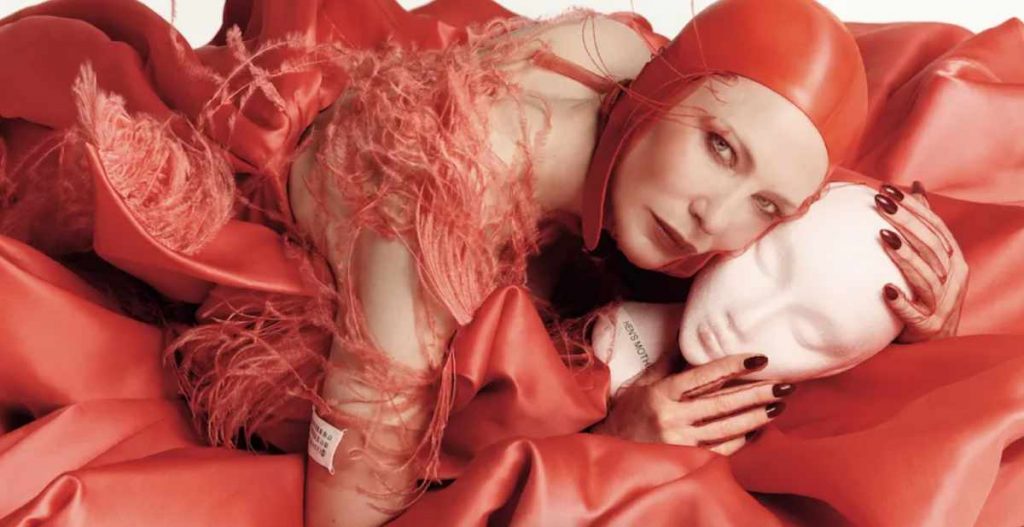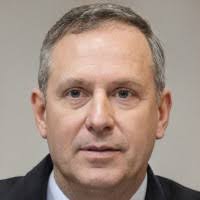
One day queen of England, another as Bob Dylan, Cate Blanchett never stops reinventing herself. But what do these multiple transformations say about her? Shortly before the release of Tár, where she plays a conductor, Antonella Bussi asked her the question. Photography Luigi & Iango Styling Michael Philouze.
Seeing the near final version of a film is one of the great pleasures of journalism. But to be able to discuss it face to face with the woman who occupied the screen for more than two and a half hours, that remains a priceless privilege. I have an appointment via Zoom and the woman in question is already there when I log on: Cate Blanchett, one of the most fabulous actresses of our time. She is sitting in her kitchen, hair tied back, wearing a beige linen outfit. Glasses, no make-up. In her intense voice, she opens the conversation by simply saying, "I was checking my email."
She plays the lead role in the highly anticipated feature film by Todd Field, a filmmaker returning to directing fifteen years after the success of Little Children. Tár is in competition these days at the Venice Film Festival. Cate Blanchett plays Lydia Tár, a conductor at the peak of her career, both powerful and riddled with weaknesses. For the role, the Australian actress learned to speak German, play the piano and conduct the Dresden Philharmonic Orchestra. The script revolves around the recording of Gustav Mahler's Symphony No. 5. But the main thing is beyond the music stand, through exchanges and debates on the fractures of contemporary culture.
What convinced you to take on this role?
"Todd Field rarely makes films. When he called me to tell me he had a script, I paused to read it, even though I'm usually pretty slow, and it can take me two weeks to find a moment to swallow a script. But this one, I devoured it right away. It was visceral. It spoke to my mind as much as my body. And beyond my desire to work with Todd, it is thus the quality of the scenario which determined my choice."
How does one prepare for such a role ?
"I spoke to a conductor friend of mine, and I realized that it was like being in the center of the stage: if you don't perceive the space well, if you don't occupy it properly, the audience doesn't follow you, they don't know where to look and they don't take you seriously. I'll be very honest: I was terrified as ever before I performed. With the pandemic, the musicians hadn't performed any major works in a long time, and when I raised my arm to set the pace, I felt out of place, out of time. But I soon realized that the musicians needed me as much as I needed them, and that somehow the notes had to follow. I learned the gestures and I have no words to describe the joy of feeling the music flow. It's an addictive experience."
"We always talk about the success, but we don't say enough about how the climb up is less taxing than the climb down."
It must be amazing to see so many individuals depending on a simple gesture from you.
"All the conductors I consulted argued that it was crucial not to show signs of weakness. It's a mask, like a theater actor's mask. No matter what, you have to pretend you know what you're doing, even if you don't: it's a leadership thing. I think eventually the leaders of the world will have to be able to say, "I don't know," or "I don't know yet," to be able to re-know that they have doubts. But for now, if you're a leader, you still have to say, "I know how things are going, follow me."
Your character experiences firsthand all the big issues that divide public opinion today. The first: age and the passing of time.
"Lydia is about to turn 50, a special moment in everyone's life. You know what you've already accomplished and you wonder how much more time you have left, what you're going to do with it. You are often at the peak of your life or career. But what happens when you come down from the top? We always talk about success, but we don't say enough about how the climb up is actually less challenging than the descent. The film confronts this question head on."
"A certain brutality is necessary in art. To create is sometimes to destroy."
The other question posed by Lydia Tár is the use of power by those in a dominant position. She uses her charisma to gain sexual favors or to indulge in petty behavior.
"This is true. And it is clearly unacceptable. The system of power as it exists can lead those who enjoy it to go through a form of dissociation. In the first place, the conductor should have been a man, and we might have talked about it differently. But the fact that it is a woman in the end allows us to look at the problem with more neutrality. The world of classical music is the world of the masters, of the great composers of the past, and everyone wonders what is allowed when one is striving for excellence. The question is simple: what is really allowed when one is in a position of power? And to what extent can talent be corrupted by that power? The film deliberately gives no answers, because questions always speak louder than answers. And in this historical moment, it seems interesting to try to understand what is going on, without judging. The power of art lies precisely in this: to help us to grasp what faces us. And only later, to allow us to judge it."
Lydia has a partner and an adopted daughter whom she adores. This family intimacy is however undermined by her desire to run away, to escape.
"When things are going well, sometimes you have to mess them up. For artists, creating often means making something else die. To create, one must destroy. That's not the way I work, but I can understand it."
The film also deals with the question of cancel culture. What do you think about it?
"Making movies, music, theater, producing art is not a political act. It is the way in which it is disseminated, digested and processed that can become so. What do we learn? I think we need to study how events unfold in a given historical context and interrogate them. For example: how do women think in a given time period? What about black people? Today, some thoughts may seem dangerous, but censoring them and not talking about them may take the danger to the extreme, condemning us to repeat the mistakes of the past. We must confront the systems that perpetuate abuse and prejudice. This is how progress is built."
"Excellence is my mistress, I court it every day in my profession. But it remains elusive."
How much of yourself is there in Lydia?
"This character has made me think a lot about what is acceptable in the pursuit of excellence. I was recently talking with an actress friend about the figure of Stella Adler, a famous theater teacher. Today, however, Stella would be pilloried, her methods considered too brutal. I believe that a certain brutality is necessary in art. Because if you want to excel, you have to have an inner judge, be hard on yourself, keep a strong critical sense about what you do. No matter what others think, a writer, actor, musician or painter is accountable to himself, and he must ask more of himself. Having said that, the methods that aim at excellence, in practice for decades, no longer work today."
But then, what is the cost of excellence?
"I don't know. And I don't think I am excellent. Excellence is my mistress, I court it every day in my profession. But it remains elusive."
A mistress, or perhaps a companion
"I know so many artists who have not had the re-knowledge they deserve. That's the cruelty of my profession, the cruelty of chance. And then, as with my character, there is the obsession with the legacy that will be left. It is also palpable in all the Elon Musks of the world, they are ready to do anything to leave a trace. The human cost is high, as well as the personal and artistic cost. But the legacy we leave is beyond our control. It is arrogant to think otherwise. You can only decide what you leave to your children."
Is it so difficult to deal with success?
"Someone told me early in my career that success reveals who you are as a person, and I still believe that's true, because it exposes you so much. But it's the failure that is the most formative experience."
How do you survive a failure?
"You can always be reborn, don't you think? If you are strong enough. According to T.S. Eliot, "what we call the beginning is often the end". And a new chapter sometimes needs a fall to be written. But this "requires humility, which is another underrated virtue.""
Your life is extraordinary…
"Let me tell you something: this summer, Europe had an incredible heat wave and we Australians are obsessed with water and how to get it. Five years ago we were considering buying big tanks for our house in England and people thought we were crazy because it always rains here. But Sussex has had droughts before. And now here comes the heat. This morning at 5 o'clock I watered my raspberry bushes with water from the reservoir so as not to waste. If we run out of water, it doesn't matter who you are or where you are. We are all connected. We have to be very humble."
You will be in Venice for the Mostra…
"Yes, and I hope it will help to fill the cinemas again. It has been a difficult time for everyone and it continues to be so. Our leaders are bad, the economy is unstable… And women are always the first to be affected: they lose their rights and control over their bodies. This instability accentuates the desire to get together, to listen to music, to go out. And to go to the movies, where we find stories that help us know who we are. With the pandemic, we have had a huge collective experience. We need to realize that we are in this together and be humble."

Written by Michael Zippo
Michael Zippo, passionate Webmaster and Publisher, stands out for his versatility in online dissemination. Through his blog, he explores topics ranging from celebrity net worth to business dynamics, the economy, and developments in IT and programming. His professional presence on LinkedIn - https://www.linkedin.com/in/michael-zippo-9136441b1/ - is a reflection of his dedication to the industry, while managing platforms such as EmergeSocial.NET and theworldtimes.org highlights his expertise in creating informative and timely content. Involved in significant projects such as python.engineering, Michael offers a unique experience in the digital world, inviting the public to explore the many facets online with him.
